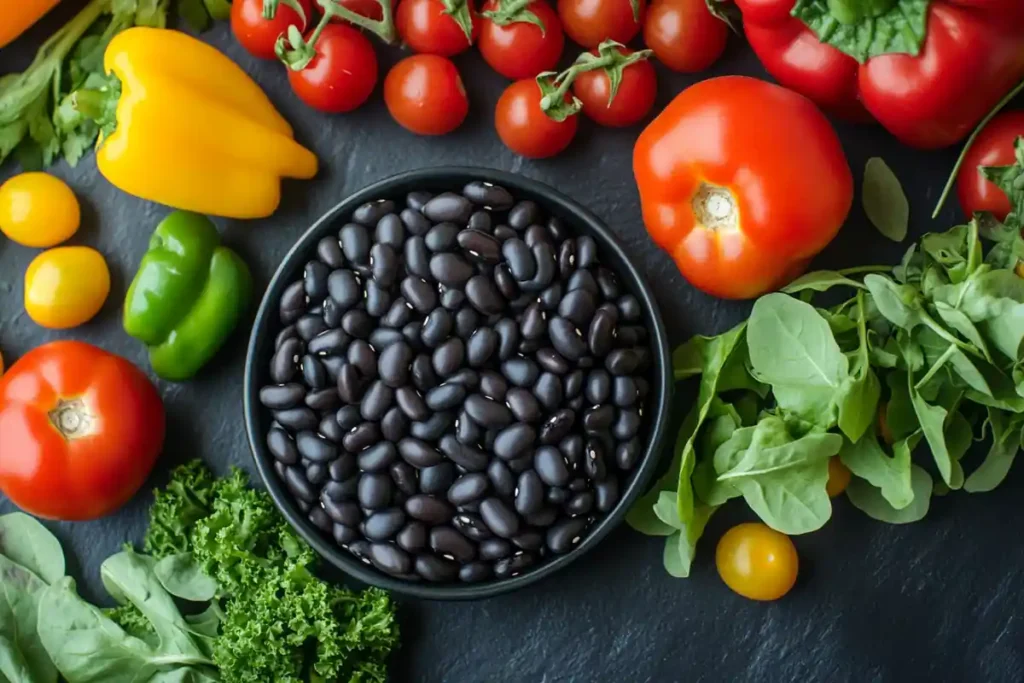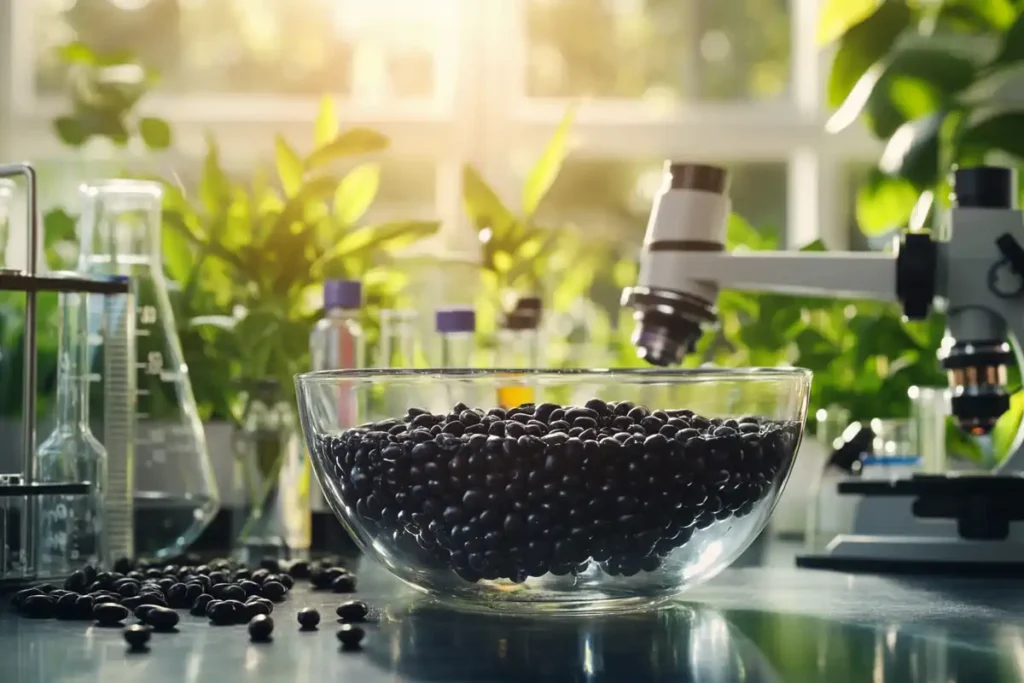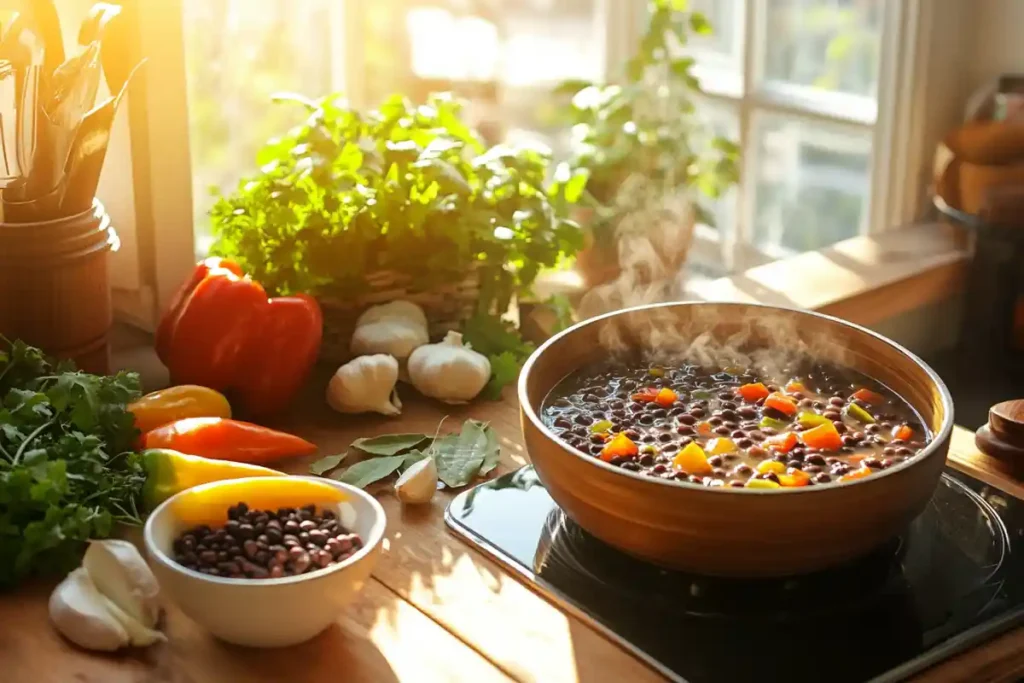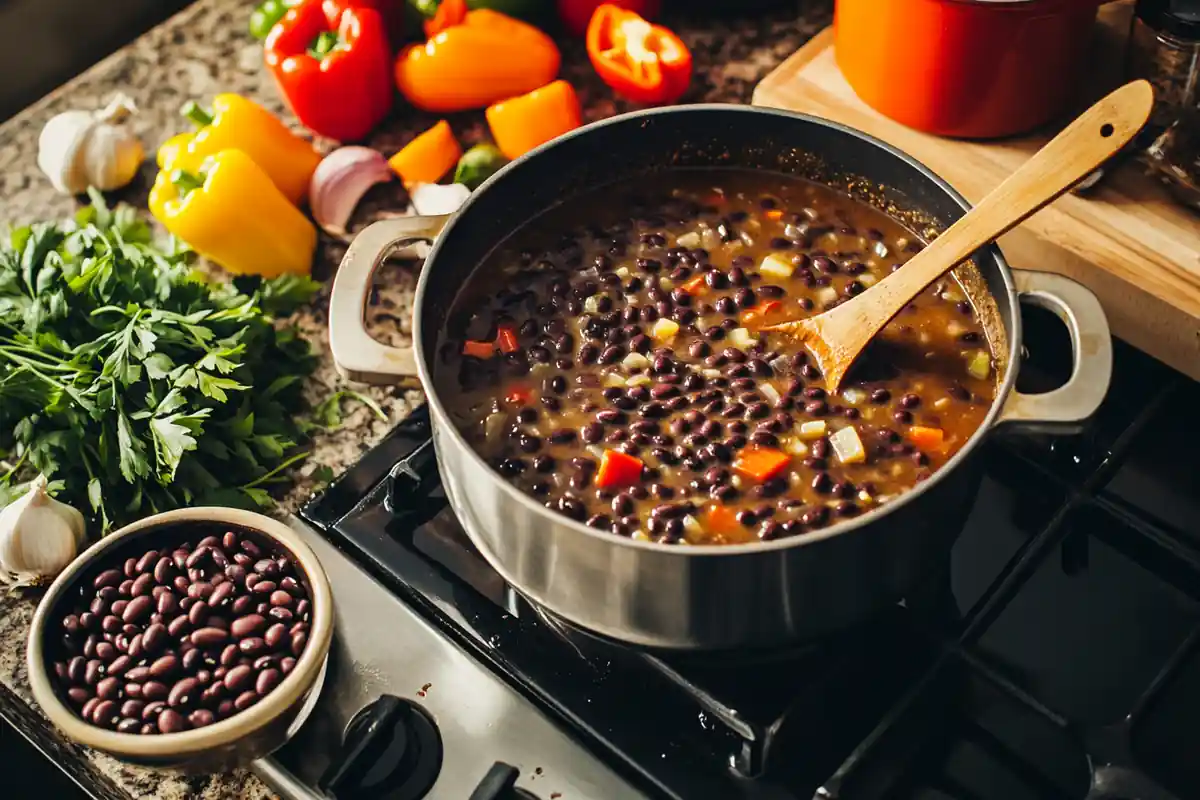introduction Soak Black Beans Soup
A cozy kitchen scene featuring a wooden countertop with a bowl of dry black beans soaking in water, vibrant fresh vegetables like bell peppers, onions, and garlic scattered around, a large pot simmering on the stove filled with aromatic black bean soup, steam rising, herbs like cilantro and bay leaves nearby, sunlight streaming in through a window, creating a warm and inviting atmosphere.
Ever wondered if soaking black beans is really needed for the best bean soup? Making a hearty black bean soup can be tricky. Home cooks often argue about the best way to make the beans tender and flavorful.
Soak Black Beans bean soup is a favorite in vegetarian recipes. It’s a nutritious and tasty meal. But, many home chefs wonder if soaking the beans is essential or just a waste of time.
There are many ways to cook Soak Black bean soup, with some cooks soaking the beans overnight. Others skip this step. The real question is how soaking affects the cooking time, texture, and taste of your soup.
Modern cooking methods have changed how we prepare beans. New research shows that soaking might not always be necessary. Depending on your cooking method and how much time you have, you might find other ways to make great black bean soup.
In this guide, we’ll explore the soaking debate in detail. We’ll look at the science of bean preparation and help you make the best bean soup. Whether you’re an experienced chef or just starting out, you’ll learn how to make a black bean soup that will wow your loved ones.
Understanding Black Beans: Properties and Benefits
Black beans are a nutritional powerhouse that can transform your healthy soup recipes with incredible flavor and remarkable health benefits. These small but mighty legumes pack a serious nutritional punch. They are perfect for Mexican soup recipes and easy soup recipes alike.

Prompt
371/1000
Image style
0/50
Photo
Image Size
1344×768 (16:9)
CancelGenerating an Image
Nutritional Powerhouse
Dive into the incredible world of black beans’ nutrition. A single cup of cooked black beans delivers an impressive nutritional profile:
- 15.2 grams of protein
- 15 grams of dietary fiber
- 610 mg of potassium
- 244 mcg of folate
Why Soak Black Beans Shine in Soups
Black beans are culinary magic for soup lovers. Their creamy texture and ability to absorb flavors make them ideal for creating rich, satisfying dishes. They transform simple recipes into nutrient-dense meals that keep you full and energized.
“Black beans are not just food, they’re nutrition in a delicious package” – Nutrition Expert
Storage and Longevity
Your black bean pantry can stay stocked with proper storage techniques. Dried black beans can last up to 2 years in an airtight container. Cooked beans remain fresh in the refrigerator for 3-5 days. This makes them a convenient staple for quick, nutritious meal preparation.
Whether you’re crafting a hearty Mexican soup or exploring healthy soup recipes, black beans offer an unbeatable combination of nutrition, flavor, and convenience.
The Great Soaking Debate: What Science Says

A close-up view of black beans soaking in a stylish glass bowl filled with clear water, surrounded by scientific equipment like microscopes and beakers, with vibrant green plants in the background, soft sunlight illuminating the scene, creating a warm and inviting atmosphere.
When making a purple black bean soup, many wonder if soaking beans is needed. Science has some interesting facts to share on this topic.
Experts have long argued about soaking beans. New studies show that soaking might not be as important as thought. They question the old idea that soaking beans cuts down cooking time a lot.
“Beans cooked without soaking can actually develop a deeper, more complex flavor profile,” says culinary researcher Dr. Emma Rodriguez.
Here are some key findings from science:
- Soaking may only reduce cooking time by 30 minutes or less
- Unsoaked beans often retain more of their natural flavor
- Cooking methods can impact bean texture more than pre-soaking
The age of your beans is also important. Fresher beans cook faster and taste better. For your purple black bean soup, keep these tips in mind:
- Fresh beans cook faster and more evenly
- Unsoaked beans can develop a richer taste
- Proper cooking technique matters more than soaking
When making vegan soup, try both soaked and unsoaked beans. Science shows that old wisdom isn’t always right in the kitchen.
Do you need to soak black beans before making soup?
Making the perfect black bean soup doesn’t always need soaking. Many wonder about the best way to prepare this tasty vegetarian soup. Let’s find out the truth about bean preparation that saves time and makes cooking better.

A vibrant kitchen scene featuring the preparation of black bean soup, showcasing a pot simmering on the stove with rich, dark broth, whole black beans soaking in a bowl nearby, fresh vegetables like diced onions, bell peppers, and garlic arranged on a cutting board, aromatic herbs scattered around, and a wooden spoon resting against the pot, all surrounded by warm, inviting kitchen decor.
The Time-Saving Truth
Surprisingly, you can skip the long soaking time when making black bean soup. Recent cooking tests show unsoaked black beans can soften in under 90 minutes. This quick method is great for busy people who love easy soup recipes.
- Cooking time for unsoaked beans: 1.5-2 hours
- Water to bean ratio: 1:8
- Potential time savings: About 8-12 hours compared to traditional soaking
Flavor Impact of Soaking vs Not Soaking
Unsoaked beans keep more of their natural taste. The direct cooking method helps keep the beans’ rich, earthy flavor that makes black bean soup so loved by soup fans.
“The key is not in soaking, but in careful cooking and seasoning.” – Professional Chef
Texture Considerations
Texture-wise, soaked and unsoaked beans are almost the same in soup. Both ways can make the soup creamy and satisfying, turning black bean soup into a favorite comfort food.
- Creamy texture achievable with both methods
- Cooking technique matters more than pre-soaking
- Consistent results with proper cooking
Your choice depends on what you prefer and how much time you have. Whether you’re always on the go or love cooking, you can make a delicious black bean soup without soaking overnight.
Cooking Methods for Black Bean Soup
Black bean soup is a versatile dish that can be cooked in several ways. Mexican recipes often use different methods to make the soup delicious. This makes it easy for anyone to cook a tasty black bean soup at home.
- Stovetop Method: Quick and direct heat application
- Slow Cooker Technique: Hands-off and convenient
- Oven Cooking: Rich flavor development
“The secret to an amazing black bean soup lies not just in the ingredients, but in the cooking method you choose.”
Now, let’s look at the cooking time and what each method offers:
| Cooking Method | Time Range | Bean Preparation |
|---|---|---|
| Stovetop | 45-65 minutes | Soaked or unsoaked beans |
| Slow Cooker | 2-7 hours | Depends on heat setting |
| Oven | 75-95 minutes | 325°F (165°C) |
Recent studies show that un-soaked black beans cook only 20 minutes longer than soaked ones. They also keep their dark color and might have a richer flavor. This makes them a great choice for your next soup.
Impact of Soaking on Bean Flavor and Color
When making a purple black bean soup, knowing how soaking affects flavor and color is key. The cooking method greatly changes the taste and look of your beans.
Black beans change a lot when cooked. Unsoaked beans keep their deep, rich color better than soaked ones. Soaking can wash out some of the natural colors, making them lighter.
Color Retention Secrets
Your black bean soup’s look depends on a few things:
- Cooking beans in their soaking liquid keeps the color strong
- Using less water helps avoid losing too much color
- Shorter soaking times help keep more of the bean’s natural color
Flavor Development Techniques
For the best vegan soup, try these tips:
- Cook unsoaked beans slowly to soak up more flavor
- Add herbs and spices while cooking for extra taste
- Choose fresh, high-quality beans for the best flavor
“The key to a spectacular purple black bean soup is understanding how cooking techniques impact flavor and color.” – Culinary Experts
Studies show unsoaked beans often taste more complex. They soak up more flavors during longer cooking, making your soup richer and more nuanced.
Digestibility and Gas-Reducing Techniques
When making vegetarian soup with black beans, digestibility can be a worry. But, there are many ways to cut down on gas and make eating beans easier.
Studies reveal that healthy adults might feel gas from legumes at first. But don’t worry! Most people get used to it in 8-12 weeks, and gas levels go back to normal.
“Start small and gradually increase your bean intake for better digestibility.”
- Begin with 2-4 tablespoons of beans daily
- Gradually increase to ½ cup per serving
- Rinse canned beans thoroughly to reduce gas-producing compounds
Here are some tips for your healthy soups:
- Soak dried beans for 8-12 hours
- Change soaking water every three hours
- Add a teaspoon of baking soda to 4 quarts of water
- Use pressure cooking for 10-12 minutes
Spices like ajwain or epazote can also help. They reduce gas and add special flavors to your soups.
When using a pressure cooker, remember to do a natural pressure release. This prevents messy foam and ensures your beans are cooked just right.
Best Practices for Cooking Unsoaked Soak Black Beans Soup
Creating delicious black bean soup doesn’t always need pre-soaking. Knowing the right cooking techniques can make your soup recipes easy and quick. Let’s look at the key strategies for cooking unsoaked black beans perfectly.
Temperature Control for Optimal Results
When making black bean soup, the right temperature is key. Aim for a gentle simmer, not a full boil. This method ensures the beans cook evenly and stay whole.
- Start with medium-low heat
- Monitor the pot consistently
- Adjust flame to maintain a soft bubbling
Liquid Ratio Guidelines
The secret to perfect black bean soup is the water-to-bean ratio. Chefs suggest a 4:1 water to bean ratio for proper hydration and cooking.
| Bean Amount | Water Quantity | Cooking Time |
|---|---|---|
| 1 cup dried beans | 4 cups water | 1.5-2 hours |
| 2 cups dried beans | 8 cups water | 2-2.5 hours |
Seasoning Tips for Rich Flavor
Boost your black bean soup with the right seasonings. Add salt at the start to let flavors soak into the beans. Try adding garlic, bay leaves, or cumin for extra depth in your soup.
“Seasoning is the key to transforming simple beans into a memorable meal.” – Culinary Expert
Always keep beans covered with liquid while cooking. Add hot water if it’s needed. Your patience will pay off with a tasty black bean soup that’s both healthy and fulfilling.
Adding Aromatics and Seasonings
Turning your black bean soup into something special starts with the right aromatics and seasonings. The perfect mix can take your Mexican soup from good to great.
A great black bean soup starts with a strong aromatic base. Here are some key ingredients to add depth:
- Fresh garlic (2-3 cloves, minced)
- White or yellow onions, finely diced
- Carrots for subtle sweetness
- Bay leaves for earthy undertones
Traditional Mexican seasonings can really make your soup pop. Add these flavors:
- Ground cumin (1-2 teaspoons)
- Dried oregano
- Chili powder
- Smoked paprika
For a bold flavor, try chipotle peppers in adobo sauce. Just one or two peppers can change your soup.
“The secret to an unforgettable soup is layering flavors from the start.” – Chef Maria Rodriguez
Pro tip: Add lime juice or red wine vinegar after the beans are soft. This keeps the soup bright and fresh.
| Ingredient | Quantity | Flavor Profile |
|---|---|---|
| Cumin | 1-2 tsp | Warm, earthy |
| Chipotle Pepper | 1-2 peppers | Smoky, spicy |
| Fresh Cilantro | 1/4 cup, chopped | Bright, fresh |
The best soups are about finding the right balance and taste. Feel free to try new things and make it your own!
Common Mistakes to Avoid When Making Soak Black Beans Soup
Making tasty vegetarian soup recipes needs careful attention. When cooking with black beans, some big mistakes can ruin the taste and feel of your soup.
Salt is key in black bean soup, but when you add it matters a lot. Never add salt at the start of cooking. Salt can make bean skins hard if added too soon, stopping them from getting soft and creamy. Wait until the beans are almost done before adding salt.
- Avoid rapid boiling, which causes bean skins to split
- Don’t discard all cooking liquid – it contains valuable nutrients
- Prevent overcooking to maintain soup texture
Be careful with acidic ingredients in your black bean soup. Adding tomatoes or vinegar too early can mess up the bean cooking. Acid can stop beans from getting soft, leaving them tough and undercooked.
“The secret to perfect black bean soup is patience and proper technique.” – Professional Chef
For the best flavor in your vegetarian soup, follow these expert tips:
- Use a heavy-bottomed pot for even heat distribution
- Add aromatics like onions and garlic carefully to avoid bitterness
- Finish with a squeeze of fresh lime to brighten the flavor
By steering clear of these common errors, you’ll make delicious and healthy easy soup recipes.
Time-Saving Tips for Perfect Black Bean Soup
Making tasty easy soup recipes doesn’t have to take a lot of time. With the right tools and techniques, you can make quick, delicious meals. These meals save time without losing flavor.
Modern cooking methods make black bean soup prep faster. Two key appliances make cooking smoother and quicker:
Pressure Cooker Magic
A pressure cooker is a game-changer for quick black bean soup. It can:
- Reduce cooking time from hours to just 20-30 minutes
- Cook unsoaked beans quickly and evenly
- Preserve nutrients and enhance flavor intensity
Slow Cooker Simplicity
Slow cookers are great for those who like a hands-off approach. They offer:
- Cook on low for 6-8 hours with minimal supervision
- Perfect for busy home cooks
- Create deeply developed flavors in vegan soup recipes
Pro tip: Prep your ingredients the night before and store them in the fridge. In the morning, just add everything to your slow cooker or pressure cooker for a hassle-free meal.
“Great cooking is about efficiency and smart techniques” – Professional Chef
More time-saving tips include using an immersion blender for quick texture changes. Freezing extra portions is also helpful. Your black bean soup can be a quick, healthy option for busy weeknights.
Conclusion
Making the perfect black bean soup is an art. It’s about finding the right balance of technique, time, and taste. Whether you soak your beans or not, it’s all about understanding the impact on your soup.
The cooking process is flexible. You can soak beans overnight or use a pressure cooker for quick results. This flexibility lets you experiment and find what works best for you.
Black bean soup doesn’t have to be hard. Cooking times vary from 30 minutes to 2 hours, depending on your method. Pressure cookers and Instant Pots speed up cooking, while slow cookers enhance flavors.
Beans are very versatile. One cup of dried black beans can make up to 3 cups of cooked beans. This means you have lots of room for creativity. Plus, cooked beans can be stored for 3-5 days in the fridge or up to 6 months in the freezer.
Remember, the best black bean soup is the one that makes you happy. So, don’t be afraid to try new things, trust your taste, and most importantly, enjoy the process!
FAQ
Do I really need to soak black beans before making soup?
No, soaking black beans is not always necessary. Studies show unsoaked beans can cook in under 90 minutes. Many chefs, like Russ Parsons, say unsoaked beans taste better and stay colorful.
How long does it take to cook unsoaked black beans for soup?
Unsoaked black beans cook in 50-65 minutes on the stovetop. They take 2-7 hours in a slow cooker. Pressure cookers can cook them in 20-30 minutes.
Are unsoaked black beans less digestible?
Studies say soaked and unsoaked beans are about the same in digestibility. To cut down on gas, add kombu or cook them well. Cooking them until tender helps with digestion.
What’s the best way to season black bean soup?
Use Mexican spices like cumin, oregano, and chili powder. Add onions, garlic, and bay leaves for flavor. Smoked paprika or chipotle pepper add depth. Fresh cilantro and lime juice or vinegar brighten the soup.
Can I freeze black bean soup?
Yes! Black bean soup freezes well. Freeze large batches for later. Cool it down first and use freezer-safe containers. It stays good in the freezer for 2-3 months.
What’s the ideal water-to-bean ratio for cooking black beans?
Use 4:1 water to bean ratio. For every cup of beans, use four cups of water. Keep the beans covered and simmer gently, adding hot water if needed.
How can I prevent my black beans from becoming mushy?
Avoid rapid boiling and overcooking to keep beans firm. Add salt when they’re almost tender. Simmer gently and check them often for the right texture.

